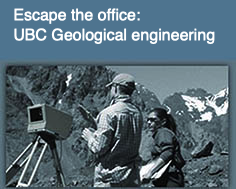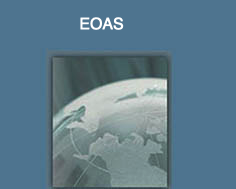- What is Geological Engineering?
- What do Geological Engineers do?
- What is the nature of the Geological Engineer's work?
- Where do Geological Engineer's work?
- How much demand is there for Geological Engineers and how is this affected by technological changes?
- Is the program difficult?
- Is the program suitable for women?
- What about graduate school?
- Where can I get more information?
What is Geological Engineering?
It is an interdisciplinary profession in which principles of Earth science are used to solve engineering and environmental problems. It links geology, civil engineering and natural resources (e.g. mining, oil & gas, forestry) to provide a versatile set of skills applicable to a wide range of contemporary problems. UBC Geological Engineering is a fully accredited program, so our graduates hold full responsibilities as registered professional engineers. The qualifications of a Geological Engineer are similar to those of Civil and Mining Engineers with emphasis on geotechnical and environmental learning, combined with an in-depth knowledge of geological processes.
Whereas other engineering disciplines work with engineered materials where the properties and behaviour are reasonably well-specified, Geological Engineers must deal with natural materials and conditions that are largely unknown and must be inferred from limited and costly observations. The principal uncertainties have to do with the accuracy and completeness with which the subsurface geological conditions and material properties are known. Thus, Geological Engineering is less subject to standardization than other engineering disciplines, with almost every assignment bringing a new and interesting challenge.
What do Geological Engineers do?
The field of Geological Engineering has a wide scope and is relevant almost to all parts of the economy. Most of our graduates work for consulting engineering or environmental firms as specialists. Many are also employed directly by mining companies and large corporations such as BC Hydro, as well as by government agencies such as the Ministries of Transportation, Environment and Forests. They carry out site investigations for mines, dams, roads, railways, pipelines and other critical infrastructure. They interact with civil engineers to design essential parts of construction projects. They are responsible for environmental assessments, or clean-up activities where pollution has occurred. They prospect for minerals, building material resources and drinking water. They carry out hazard and risk assessments and mapping for landslides and earthquakes. No wonder that, with this wide variety of applications, that there is a high demand for our graduates.
What is the nature of the Geological Engineer's work?
The work of a Geological Engineer is multifaceted. Work on a typical project begins in the office by searching for existing information about the site via maps, geological reports and airphotos. Fieldwork involves mapping, helicopter reconnaissance, and supervision of drilling contractors. Core logging and a variety of laboratory tests are carried out. The data is then compiled and interpreted in the office, usually with the use of software such as GIS, mapping and logging programs, and AutoCad. Where necessary, computer analyses of slope stability, stress and deformation, groundwater flow and other aspects is carried out. A report is than issued to the client. During project construction, the Geological Engineer visits the site routinely to ensure all the recommendations are followed. The construction phase often involves installation and interpretation of field instruments to verify the design and monitor for unexpected deviations from the design.
Senior Geological Engineers, having accumulated many years of experience on a wide variety of projects, often become highly valued specialists. Many continue practicing their profession well past the retirement age, working as specialty consultants, or expert witnesses.
Where do Geological Engineer's work?
Geological Engineers work for both large mining/oil/civil engineering companies and smaller specialty consulting firms, with a large proportion becoming partners or owning shares in their companies in the case of the latter.
Geological engineering assignments vary widely in scope. Some may be only a short field inspection, followed by a brief technical memo. Others may involve the effort of a team of professionals and technicians, stretching over a year or more. Many projects are situated locally, others in various parts of Canada (including the North). Many Canadian consulting firms work extensively overseas and their employees travel regularly. As a Geological Engineer, you have a possibility to choose the nature of your work. Some prefer to do analytical work in the office or laboratory, others like to spend much of their time in the field. Some concentrate on local work, others enjoy frequent international travel.
How much demand is there for Geological Engineers and how is this affected by technological changes?
With ever-increasing population growth, our society demands increased safety in the face of natural hazards, improved urban infrastructure, and improved access to water, energy and mineral resources. This presents a continual series of fresh challenges to Geological Engineering professionals, as new tunnels, dams, mines, transportation corridors and energy supplies are required. Both new and existing surface and underground mines are going deeper into areas providing extreme and diverse engineering challenges. Communities and their infrastructure are exposed to a wide variety of natural hazards as they expand into rugged mountainous terrain. Energy needs are promoting the development of more complex hydrocarbon deposits, such as oil sands and gas shales, while increased energy consumption mandates new solutions to mitigate the impact of burning fossil fuels on the environment, for example CO2 sequestration. These societal challenges will continue to drive the already high demand for Geological Engineers. In parallel, technology will continue to be developed to the benefit of Geological Engineers, allowing them to better face these enormous challenges in the future. The Geological Engineering profession is constantly evolving as technological advances are introduced into practice. At the same time, the productivity of Geological Engineers is not as dependent on computers and automation as it is for other engineering disciplines. Much of our work requires human judgment, which cannot easily be supplanted by computers.
Is the program difficult?
Yes, it is demanding, but not in a one-sided way. You need a strong foundation in math, physics, chemistry, geology and engineering science. But that is not all. You also need to have a good memory and sound judgment. Above all, you need to be interested in the natural world around you. Our students are creative problem solvers, who enjoy both outdoor and office work, and enjoy travel. Geological Engineering careers involve lifelong learning.
Is the program suitable for women?
Yes! Approximately, 33 % of our graduates are women, more than most other engineering disciplines. Many are often our best students and occupy highly responsible jobs after graduation.
What about graduate school?
Most Geological Engineering professionals eventually continue their studies after working for two to three years as a junior engineer. This involves returning for an M.Eng. or M.A.Sc. degree, and in some cases where they are interested in getting involved in the management of a consulting firm or other company, a M.B.A. Others who enjoy research will continue on to do a Ph.D.
Where can I get more information?
You can get more information by visiting the other pages of our website or those of the Department of Earth, Ocean and Atmospheric Sciences (click here). You can also contact the Director of the program via e-mail: Dr Erik Eberhardt.



